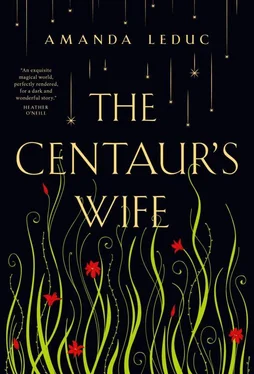“You belong in the pond,” she would say. “That is your table. You do not belong at mine.” Then she would close the castle door.
Each time this happened, the geese would wait in a cluster until the goose girl came to fetch them. She would coax them home with bread, even though the queen had forbidden this— Geese should eat roots and stems, she said, and she wasn’t wrong—and herd them back down to the pond and from there to their enclosure. It was the goose girl’s job to make sure the geese were safely tucked away at night so that the foxes wouldn’t eat them. Each night she walked the geese up into their coop—a larger, more elegant one than had been built for the chickens—and made sure they were settled in their nests before closing the coop door and locking it tight.
Every night, before she closed the door, the geese asked her the same question.
“Why can’t we eat at the queen’s table?” they said. “Why won’t she have us, if indeed she loves us so?”
“The queen eats bread,” the goose girl told them. “And bread is not good for you.”
“But you feed us bread,” the geese retorted.
“I feed you bread only when you will not listen,” the goose girl said. “If you come with me when I tell you to, I will not feed you bread anymore.”
The oldest of the geese was a matriarch named Dorrie. When she heard this from the goose girl, she shook her head. “But if you give us bread until we listen,” she said, “then what’s to stop us from ignoring you all of the time? You are the goose girl, but you make no sense. Why should we listen to you at all?”
“Who keeps you safe?” The goose girl was growing annoyed. “Who takes you out into the sun each day, and brings you down to the pond so you can splash in the water and attend on the queen? Who makes sure that you’re protected from the foxes? You are ungrateful, goose, and it is very unbecoming.”
“I am not ungrateful,” said Dorrie. “I want to know why I am not good enough for the queen’s table when the queen’s royal gown is good enough for my pond.”
The goose girl looked at Dorrie, then sighed. “Only the queen can tell you that,” she said. “Would you like to ask her yourself?”
“Yes,” Dorrie said. “I would.”
The goose girl made sure that the rest of the geese were locked safely in the coop, and then took Dorrie back to the castle. When the soldier at the door saw Dorrie, he shook his head and refused to let them enter. In response, Dorrie reared up and beat her wings in the air. She was the largest of the geese, and her wings stretched six feet from tip to tip. She beat the guard over the head so hard that he fell; when other guards came running, Dorrie squawked so loud the entire castle heard her.
“Let her in!” the goose girl shouted, and this time the guards obeyed.
When they got to the dining hall, the queen was already standing.
“Dorrie,” she said, in her most regal voice. “Dorrie, what’s all this?”
“I want to sit at your table,” Dorrie said.
“Silly goose,” the queen said. “Geese do not sit at my table—that’s why you have a pond.”
“The world is larger than my pond!” Dorrie cried. “The world is larger than my coop, than the yard, and larger even than your castle. I am not a silly goose.”
The queen looked down at Dorrie, then sighed. “Very well. Come here, Dorrie, and sit down.” She pulled a great chair out from the table and motioned for Dorrie to take it. Dorrie climbed in without difficulty. She wrapped her wings around the silver fork and knife at her place and looked up at the queen.
“That is better,” she said. “Where is the bread?”
“There is no bread,” the queen said. “We are having goose for dinner.” Then she slit Dorrie’s throat with the knife she’d been hiding up her sleeve. Dorrie could do nothing except watch her blood spill out onto the tablecloth. When her eyes finally closed, the queen nodded to her servants.
“Clean that up,” she said. Then she went back to her meal.
The goose girl, unnoticed, slipped out of the dining hall and away from the castle. She crept into the farmyard and unlocked the coop and brought the geese out, one by one, and told them what had happened to Dorrie.
“I won’t feed you bread anymore,” she said. “The world is much larger than bread, and far more delicious. You deserve to know that for yourselves.”
Then the goose girl and her geese took leave from the kingdom, and were not heard from again.
Estajfan runs alone. He’s always run alone. In the mornings he’s gone before Petrolio and the others are even awake. His gallop down the mountain is a whirlwind of light and sound, a tangled fall of dark trees and leaves—in the bitter winter wind, in the summer with the rush and hint of morning sun to come. He jumps and he lands and he lunges and jumps again, his arms spread for balance, his muscles tensing and releasing over and over again.
It feels good to be alive in these moments, possibly because he knows it could all change so quickly—one hoof snagged and down he would go, a foreleg snapped, tumbling in a different way, the weight of his body the thing, in the end, that will kill him. But he doesn’t stumble. He runs and jumps, and always his hooves land exactly where they should. He doesn’t break.
When the mountain meets the ground, he keeps on running. He runs until he reaches the edge of the mountain forest and can see the houses and their already overgrown yards through the trees. And then he stops, and waits.
The ground magic is different here, where the earth is flat. It used to be louder, but it has been muffled by the human houses and human roads, by the pipes that run underground and disrupt the dirt.
It’s getting louder now, day by day.
The trees are moving slowly south—half an inch this day, half an inch the next. He feels them stretch their roots beneath the soil and inch forward the way caterpillars inch along their branches. The way that vines are inching over the houses. The way that slowly, slowly, the human city is sinking back into the green.
No one has noticed this yet, he thinks, except perhaps for Heather.
They will notice soon enough.
He hears her footsteps on the sidewalk long before she comes into view. The city is so quiet now. There are cars, but only rarely—there is no power, so the houses do not rumble and shake. There are noises now and then from the centre of the town, but nothing like they used to be. It isn’t hard to hear the ground bring her close to him. That gait— tap-TAP, tap-TAP— that belongs only to her.
He sinks into the trees as she comes into view. She will go into the forest as far as she is able, and walk amongst the trees with her girls. She tells them stories, or she weeps silently as they wail to the sky.
She is looking for him. He knows she is always looking for him.
When he was younger, he ran only at night. He ran down the mountain and past the city nestled in its shadow—beyond the foothills, beyond the rivers. He ran through the flatlands—keeping always in the shadows and away from human roads. When he needed to hide, the ground told him where was safe.
Their father had also been restless. Gone from the mountains for days at a time as a horse, and gone for days at a time in his new life as an in-between thing, hiding the way that Estajfan would eventually learn to do. He came back to the mountain with clothing and toys and all manner of human paraphernalia—pots and pans, books that he shelved on a structure he made from dead trees. At night he told his children stories of their village, even though Estajfan had known, from the time he was small, that they did not belong there. Not as a family. He knew their father went back to the village and roamed it at night when everyone was sleeping. The toys that he brought them, the tools that he used to build things on the mountain—all of this came from the village and smelled of the past.
Читать дальше













